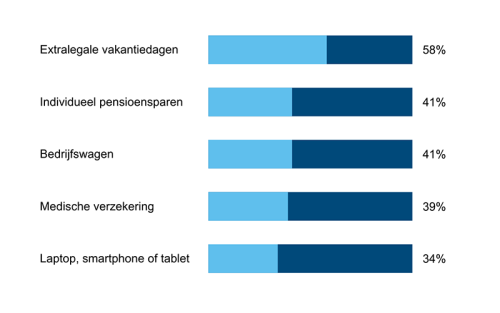Rewarding: not just money counts
Rewarding and compensating your employees: how exactly do you do that? Recent research by Ghent University reveals that offering telecommuting lessens the appetite for a pay raise. Rewarding doesn't actually have to consist solely of "money," as Acerta' s survey of more than 2,000 employees proves. We provide you with tips for an improved and motivating pay policy.
Benefits are welcome
One-third of employees like to bulk up their pay checks by benefits being awarded. Non-statutory holidays (58%), pension savings (41%) and the company car (41%) are coveted benefits in particular. A clear signal that it's not just money that counts.

Figure 1: Top-five benefits desired by employees who want a pay raise through benefits being awarded
The basis of your pay policy
The same Acerta survey found that 34% of employees do not believe their employer's pay policies are motivating. Not entirely surprising, given neither do 45% of Belgian workers know the criteria by which their employer sets wages. Transparent communication will be crucial in a first step toward a motivating pay policy. In addition, it is also important that pay policies feel fair and reasonable. This makes a proper HR structure with job classifications essential.
Choices boost autonomy
As a company, you can respond to the individual needs of your employees by providing choices in your pay policy. You can build in that freedom of choice, such as through a cafeteria plan. By allowing your employees to make choices, you increase their autonomy, and that in itself has a motivating effect.
In addition to the "autonomy" pillar, there are also the "commitment" and "competence" pillars that contribute to motivated and happy employees. For instance, collective bonuses are perceived as motivating by 53% of employees and 28% would like to see willingness to learn as a determining factor in their compensation.
Hybrid working is here to stay
Nearly nine in ten (87%) of workers are won over to the hybrid work model: a combination of working from home and working in an office. Employers also favour hybrid work, according to an earlier panel survey by Acerta. This makes offering home working an asset not to be underestimated, and one that you can also use as an alternative form of storage, according to the UGent study mentioned above. There is still work to be done, however, as more than half of companies do not have a home working policy in place, which also prevents them from fully embracing the benefits of a hybrid work organisation. Time for action!
Start with hybrid working
Hybrid working is the form of work combining the best of both worlds. However, how do you tackle this as an organisation?

Written by
Senior Consultant

